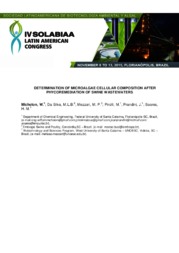Determination of microalgae cellular composition after phycoremediation of swine wastewaters.
Determination of microalgae cellular composition after phycoremediation of swine wastewaters.
Author(s): MICHELON, W.; DA SILVA, M. L. B.; MEZZARI, M. P.; PIROLLI, M.; PRANDINI, J.; SOARES, H. M.
Summary: Phycoremediation of swine wastewaters has been widely reported as an attractive tertiary treatment system, that effectively removes the excessive nutrient loadswhilst offering a valuable source of feedstock biomass. Digestate from an upflow anaerobic sludge blanket (UASB, 6%v/v) and a nitrification reactor (NR; 50% v/v) were used as culturing media to microalgae. Experiments were carried out in lab scale photobioreactors (PBRs) using a consortia of Chlorella and Scenedesmus. Ammonia (44 to 90%) and phosphorus (77%) were efficiently removed from both effluents tested after 4 days. Microalgae biomass harvested from the UASB effluent showed 57, 34 and 1% of proteins, carbohydrates and lipids, respectively. Comparatively, the cellular composition of microalgae grown on NR effluent had lower protein (43%) but higher carbohydrate (42%) contents. Negligible difference in lipid fraction was observed independently of the effluents tested. The results suggest that the biomass harvested from phycoremediation of swine wastewaters can offer a valuable protein and carbohydrate feedstock for nutritional and biotechnological applications.
Publication year: 2015
Types of publication: Paper in annals and proceedings
Unit: Embrapa Swine & Poultry
Keywords: Carbohydrate, Lipid, Phycoremediation, Protein, microalgae
Observation
Some of Embrapa's publications are published as ePub files. To read them, use or download one of the following free software options to your computer or mobile device. Android: Google Play Books; IOS: iBooks; Windows and Linux: Calibre.
Access other publications
Access the Agricultural Research Database (BDPA) to consult Embrapa's full library collection and records.
Visit Embrapa Bookstore to purchase books and other publications sold by Embrapa.

